|
|
|
Sort Order |
|
|
|
Items / Page
|
|
|
|
|
|
|
| Srl | Item |
| 1 |
ID:
117109
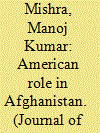

|
|
|
| 2 |
ID:
117110
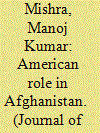

|
|
|
| 3 |
ID:
087058
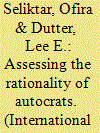

|
|
|
|
|
| Publication |
2009.
|
| Summary/Abstract |
In 1960, Thomas Schelling warned that.. petty dictators may soon have the ability to startle us out wits with a nuclear explosion somewhere.Although nearly a half-century has passed since Schelling wrote those words, the anxiety which they reflect is undiminished, especially concerning autocratic rulers of rogue states.
|
|
|
|
|
|
|
|
|
|
|
|
|
|
|
|
| 4 |
ID:
137376
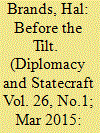

|
|
|
|
|
| Summary/Abstract |
Scholars have detailed the American “tilt” toward Iraq during the 1980s. There is, however, an important pre-history to this relationship, which has only emerged with the release of new American and Iraqi documents. American overtures to Saddam Hussein originated not under Reagan, but under his predecessor. From early in his presidency, Jimmy Carter sought to engage Iraq in hopes of moderating the Baathist regime and fortifying America’s position in the Persian Gulf and broader Middle East. Though this diplomacy ultimately proved unsuccessful, this episode has implications for the study of Carter’s foreign policy and the evolution of American–Iraqi relations.
|
|
|
|
|
|
|
|
|
|
|
|
|
|
|
|
| 5 |
ID:
095515
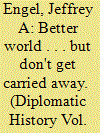

|
|
|
| 6 |
ID:
114717
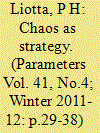

|
|
|
| 7 |
ID:
109515
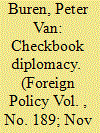

|
|
|
| 8 |
ID:
129305


|
|
|
| 9 |
ID:
173771
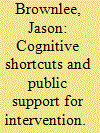

|
|
|
|
|
| Summary/Abstract |
Scholars of public opinion on military intervention agree that survey respondents make judgments from limited information. Yet researchers still question whether ordinary Americans reflect elite attitudes or instead reach their own “pretty prudent” conclusions from the stated principal policy objective (PPO). This article adjudicates the debate while incorporating lessons from the study of bounded rationality. Evidence comes from an original data set of aggregate US public opinion, covering 1,080 nationally representative survey items about launching operations, across thirty-five countries, during 1981 to 2016. Tests show that PPO matters: pursuing “internal policy change” is less popular than restraining international aggression. However, language reflecting White House cues and one prominent cognitive shortcut (the “availability heuristic”) statistically and substantively outperforms PPO at predicting intervention support. The results indicate that when ordinary Americans are polled about using force against salient foes (Saddam Hussein, al-Qaeda, Islamic State in Iraq and Syria), elements of bounded rationality can overtake the prudence expressed toward less vivid problems.
|
|
|
|
|
|
|
|
|
|
|
|
|
|
|
|
| 10 |
ID:
099905
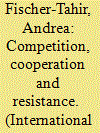

|
|
|
|
|
| Publication |
2010.
|
| Summary/Abstract |
After the fall of Saddam Hussein's regime in April 2003 many women supported the process of transition and became active in political parties and coalitions. A wide range of groups were also formed which pursued women's rights agendas and, in many cases, included a call for peace and reconciliation and charity activities for women and children. However, female political action and the field of women's rights remain divided by the same multiple boundaries of belonging which affect Iraqi society itself; women operate in specific ethnic and denominational, local and regional settings, and they support nationalist, secularist, left-wing or Islamist agendas. Women's rights-whatever the direction-can be of major or minor concern.
This article outlines female political action and draws attention to the key issues which are discussed, in particular, by secular feminists in Iraq. In so doing, the article highlights how women in Iraq have not only lost, as a wide range of observers argue, but have also benefited from the restructure of the political landscape. Female political activists are still faced with old and new social, cultural, legal and political obstacles. The article argues that when women support narratives that leave men's superiority untouched, they are not simply victims of men or 'false consciousness'; women either compete and cooperate, or they reject ideological narratives and power relations, while pursuing agendas of individual interest. Yet, despite competition among women and women's groups, and women's loyalty to agendas controlled by men, radical overtones that resist male domination can be heard- and should be supported.
|
|
|
|
|
|
|
|
|
|
|
|
|
|
|
|
| 11 |
ID:
153590
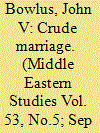

|
|
|
|
|
| Summary/Abstract |
Since the discovery of oil at Kirkuk in northern Iraq, oil has shaped relations between Iraq and Turkey, as the former needed markets and export routes to the Mediterranean and the latter reliable sources of supply. This article examines the origins of the Kirkuk–Ceyhan oil pipeline from northern Iraq to the Turkish Mediterranean coast, charting the period of Iraqi–Turkish economic rapprochement in the 1960s to the construction of the pipeline in the 1970s. It also seeks to add to our collective understanding of why transnational oil pipelines in the Middle East succeed or fail by examining the pipeline's operational record.
|
|
|
|
|
|
|
|
|
|
|
|
|
|
|
|
| 12 |
ID:
109552
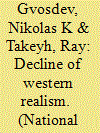

|
|
|
|
|
| Publication |
2012.
|
| Summary/Abstract |
WHEN OPERATION Odyssey Dawn commenced in the skies over Libya on March 19, 2011, it represented a major turnaround in U.S. policy. Only nine months earlier, U.S. ambassador Gene Cretz had characterized the regime as a "strategic ally" of the United States due to Libyan cooperation on counterterrorism and nonproliferation issues (and its halting, tentative steps toward greater openness). Now Libya found itself on the receiving end of conventional U.S. military power for repressing a civilian population agitating for governmental change.
|
|
|
|
|
|
|
|
|
|
|
|
|
|
|
|
| 13 |
ID:
127125
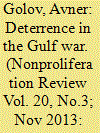

|
|
|
|
|
| Publication |
2013.
|
| Summary/Abstract |
A recently published collection of captured Iraqi records offers an opportunity to better understand Saddam Hussein's perception of US and Israeli deterrence signals, affording innovative insights into the reasons behind Iraq's restraint from using weapons of mass destruction against Israeli targets during the 1991 Gulf War. This article tests a wide range of suggested hypotheses, and suggests that US and Israeli deterrence played only a minimal role in dissuading Iraqi use of WMD. The article concludes with some thoughts on the practical implications, particularly on the effectiveness of a "no-first-use" nuclear policy.
|
|
|
|
|
|
|
|
|
|
|
|
|
|
|
|
| 14 |
ID:
079326
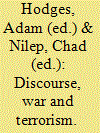

|
|
|
|
|
| Publication |
Amsterdam, John Benjamins Publishing Company, 2007.
|
| Description |
vi, 248p.Hbk
|
| Standard Number |
9789027227140
|
|
|
|
|
|
|
|
|
|
|
|
Copies: C:1/I:0,R:0,Q:0
Circulation
| Accession# | Call# | Current Location | Status | Policy | Location |
| 052654 | 909.831/HOD 052654 | Main | On Shelf | General | |
|
|
|
|
| 15 |
ID:
096331


|
|
|
| 16 |
ID:
096970
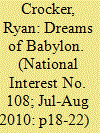

|
|
|
| 17 |
ID:
121503
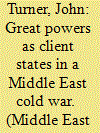

|
|
|
| 18 |
ID:
100262
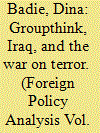

|
|
|
|
|
| Publication |
2010.
|
| Summary/Abstract |
Existing scholarship on the Iraq War decision-making process generally treats the event as a logical extension of pre-existing ideas and policies. This paper considers the Bush administration's decision to absorb Iraq into the broader War on Terror as a deviation from long-held views of Saddam Hussein. I argue that the decision to incorporate Iraq into the wider post 9/11 mission was pathologically driven by groupthink, which caused a shift in the administration's view of Saddam from a troubling dictator to an existential threat to US security. Therefore, groupthink can simultaneously explain the defects in the decision-making process and the shift from cautious restraint to accelerated urgency with respect to US relations with Iraq.
|
|
|
|
|
|
|
|
|
|
|
|
|
|
|
|
| 19 |
ID:
128211
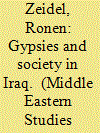

|
|
|
|
|
| Publication |
2014.
|
| Summary/Abstract |
This article focuses on a Gypsy group that lives in Iraq, away from the main concentrations in Europe. Although Gypsies apparently arrived in Mesopotamia around the tenth century, long before many Arab tribes and despite their cultural assimilation into the local culture, Gypsies were not assimilated into the local society, partly because the local society rejected them and partly because they did not want to assimilate. The difference in the attitude of the local society to the Gypsies lies in their perceived 'impurity' and their occupation, dancing and music, in which Gypsy women are employed. Iraqi Gypsies had long suffered from social as well as governmental discrimination: Iraqi citizenship was given to them only in 1979. Unexpectedly, it was the Iraqi dictatorship of Saddam Hussein which improved their status considerably, yet, at the same time, made them dependent on the regime. Consequently, after the fall of the Ba`th regime, Gypsies now face a bleak future. The article gives a concise historical presentation of Gypsy life in twentieth century Iraq and takes a closer look at literary views of the Gypsies, reflecting the limits of liberal attitudes toward them.
|
|
|
|
|
|
|
|
|
|
|
|
|
|
|
|
| 20 |
ID:
140089


|
|
|
|
|
|
|
|